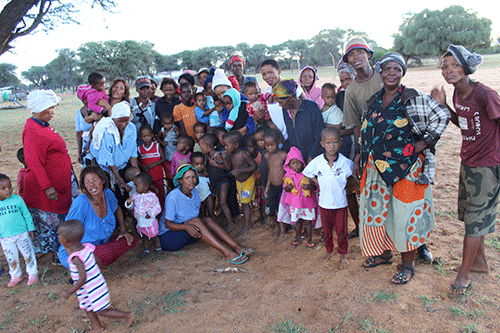AMINUIS – Magrieta Kainamses lost her baby while on her way to the Gobabis State Hospital to deliver after waiting for an ambulance for over three days.
The Aminuis Corridor 4 resident said she called the local clinic to contact the ambulance service, and they agreed to send one. But afterwards they reneged, saying there was no ambulance available.
“I waited for three days, and then my family contributed money for me to look for a private vehicle. Just on my way to the hospital, the contractions began. I gave birth in the car, but my baby did not survive,” she told New Era recently.
Kainamses and many other residents of the Aminuis constituency’s Corridors 4, 13, 17 and 21 feel developmentally segregated due to the lack of an ambulance and medicine at the clinic in Onderombapa in the Omaheke region.
Constituency councillor Peter Kazongominja told New Era that 12 people have so far died due to the lack of an ambulance to take them to hospital.
Eight of those people were from Corridor 21, where members of the Bakgalagadi community live. Two adults were from the Aminuis area, while two babies were from Corridor 4, where the Naro San community resides.
“People are suffering. When the ambulance does not show up and family members do not have money to pay for private transport that costs about N$600, they have no other choice but to stay with their loved ones until they lose their lives,” he lamented.
Kazongominja said a week can pass without medicine in their clinic, because there is no transport to bring it here.
“The medicine is transported by ambulance and a week can pass without the medicine in the clinic. It is a sad reality,” he added.
Health extension worker in Corridor 21 Aletta Dikokobele confirmed that people sometimes default on their medication due to a lack of transport and medicine.
“Sometimes, people manage to get transport. But when they get to the clinic, there is no medicine,” she noted.
Concurring with the health worker was the chairperson of the Bakgalagadi Traditional Authority, Andreas Kaiser, who said those who mostly default on their medication are people living with chronic diseases and high blood pressure.
He stressed that there is a need for a health outreach programme in the community to minimise travel costs to access health services.
“One of the things we were thinking about was having a mobile clinic so that they could be visited twice a week.”
Kainamses said although her parents have been performing home baby deliveries, she opted to go to the hospital after the health ministry’s awareness of the importance of hospital deliveries.
Her sister, Dina Kainamses, also delivered her baby in a private car after she waited for an ambulance for two weeks.
“I am lucky that my baby survived. It was the worst experience ever, and I want the government to consider our vulnerability and assist with an ambulance in the constituency. It will help us a lot because we, the Naro community, are marginalised and depend wholly on wild fruits and pensioners’ grants. It is very bad. I think we are developmentally segregated,” she reiterated.
Kazongominja then offered his private vehicle to the Bakgalagadi community in the Corridor 21 community to transport them to hospital twice a week.
The vehicle has not yet been received, as he has to make arrangements with his son, who will be the driver.
- ljason@nepc.com.na


